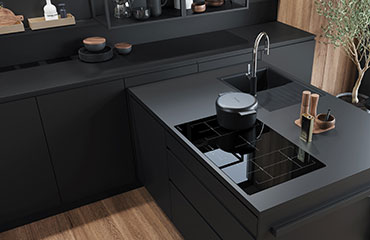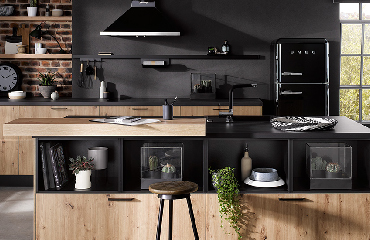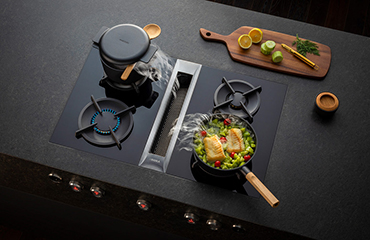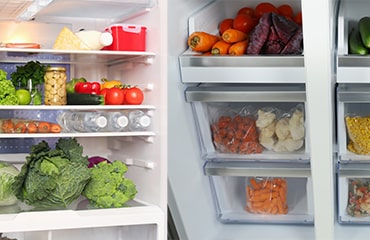
The Best Luxury Wine Fridges | Elevate Your Collection with Style
Indulgent Wine Fridges: Showcasing and Preserving Your Wine Collection in Style Discover the...
Read More icon
Posted On: February 07, 2023
Hey there! Have you ever thought about making your kitchen more eco-friendly? Some simple practices can help reduce waste, conserve resources, and promote sustainability. Plus, it's a great way to save money in the long run! To grow your herbs, you can make your kitchen eco-friendly with reusable containers and bags. This discussion will share some tips and tricks for creating a more sustainable kitchen. Let's dive in!
Avoid using disposable containers and bags for food storage and shopping. Instead, use reusable containers made of glass, stainless steel, or silicone, which are safe for food storage and can be used repeatedly. You can also use cloth bags for grocery shopping, which are sturdy and washable.
Buying in bulk can help reduce the amount of packaging waste, contributing to the growing problem of plastic pollution. Choose grains, spices, and nuts stored in reusable containers. This reduces waste and can save you money in the long run.
Investing in energy-efficient appliances can help reduce energy consumption and save you money on your energy bills. Look for devices certified by Energy Star, which means they meet strict energy-efficiency guidelines. You can also save energy by using your appliances efficiently, such as only running your dishwasher when it's full or using your oven for multiple dishes at once.
Many conventional cleaning products contain chemicals harmful to the environment and pose health risks to you and your family. Opt for natural cleaning products like vinegar, baking soda, and lemon juice, which are safe and effective for cleaning. You can also make cleaning products using simple ingredients like vinegar and water.
Composting food waste is an excellent way to reduce the amount of waste sent to landfills and create nutrient-rich soil for gardening. You can start a compost bin in your backyard or use a composting service if available. Composting food waste not only reduces waste but also helps to reduce greenhouse gas emissions.
Choose cookware made from cast iron, stainless steel, or glass, which are durable and long-lasting. Avoid non-stick cookware containing harmful chemicals that can leach into your food and the environment. You can also choose cookware made from recycled materials or sustainable production methods.
Instead of paper towels and napkins, use cloth towels and napkins that can be washed and reused. This reduces waste and saves you money in the long run. You can also use old t-shirts or towels that you no longer need as cleaning rags.
Rather than purchasing bottled water, which adds to plastic waste, use a filter to purify your tap water. You can also carry a reusable water bottle to avoid buying bottled water while on the go.
Growing your herbs is a simple way to add fresh flavour to your meals while reducing packaging waste from store-bought herbs. You can grow herbs in a small pot on your windowsill or a larger container on your patio. This reduces waste and saves you money in the long run.
Conclusion:
Making our kitchens more eco-friendly is good for the environment and is also suitable for our health and our wallets. With a little effort and mindfulness, we can make our kitchen a hub for sustainable living while enjoying delicious meals that are good for us and the planet. So let's start making some small changes today, and together, we can create a brighter, cleaner, and more sustainable future!

Indulgent Wine Fridges: Showcasing and Preserving Your Wine Collection in Style Discover the...
Read More icon
Luxury kitchen appliances play a crucial role in creating a high-end culinary space. Choosing the perfect...
Read More icon
Are you tired of using outdated and inefficient kitchen appliances? Do you want to elevate your cooking experience...
Read More icon
Are you tired of ordering pizzas from restaurants and not getting the authentic taste you crave? Well, we...
Read More icon
When it comes to choosing a hob for your kitchen in Hyderabad or Vizag, you have two main options: an...
Read More icon
Looking to update your kitchen in Hyderabad or Vizag in 2023? Look no further than Kitchen Stories for the...
Read More icon
Cooking should be a fun and creative experience. That's why we offer a variety of kitchen tools and gadgets...
Read More icon
Are you looking for the latest kitchen trends to incorporate in your home? Look no further than Kitchen...
Read More icon
If you you're a coffee lover, you know how important having a reliable coffee machine at home is. With so...
Read More icon
Inbuilt hobs come in two main types: gas and electric. Each type of hob has its advantages and disadvantages...
Read More icon
A built-in fridge and freezer can be a convenient and attractive addition to any kitchen. But, like...
Read More icon
A modular kitchen comprises pre-manufactured cabinets, countertops, and other components. These components...
Read More icon
Avoid using disposable containers and bags for food storage and shopping. Instead, use reusable containers...
Read More icon
Your kitchen is a vital room in your home. It's where you cook and make memories. It's where you'll spend...
Read More icon
Modular kitchens have become increasingly popular in recent years, as they offer a more efficient and...
Read More icon
Have you ever wondered how everything works out fine in a kitchen and is just placed at the right place and ...
Read More icon
Without contemporary appliances, a modern kitchen is incomplete. Kitchen Stories (Hyderabad & Vizag) has made ...
Read More icon
When it comes to kitchen appliances, the sky is the limit. Kitchen appliances are available to suit every...
Read More icon
A modular kitchen is a fundamental and adaptable approach to fixing all your kitchen issues. There is not ...
Read More icon
One of the most significant decisions you'll have to make when building a new kitchen or remodelling your...
Read More icon
There is an element of "smart" in almost everything these days - smartwatches, smartphones, smart homes...
Read More icon
When it comes to modern homes, the kitchen has evolved from closed-off rooms to areas where the whole...
Read More icon
A well-stocked kitchen is �the� secret weapon to getting healthy and delicious dinners on the...
Read More icon
Kitchens are a reciprocation of one�s personality. As modular kitchens are on high demand...
Read More icon© 2026 Kitchen Stories | All rights reserved